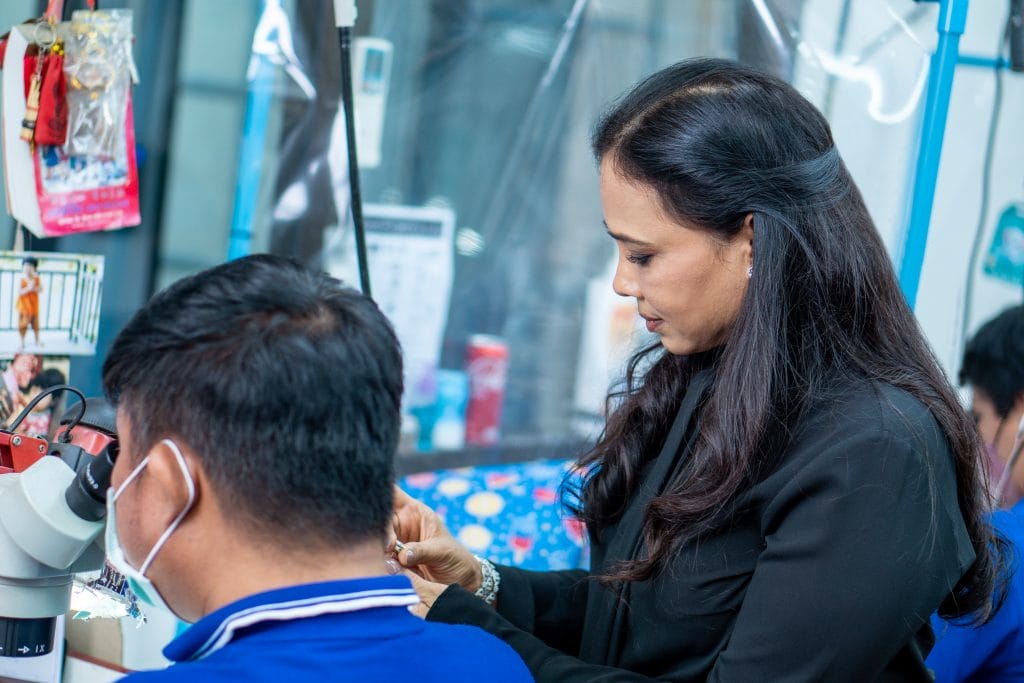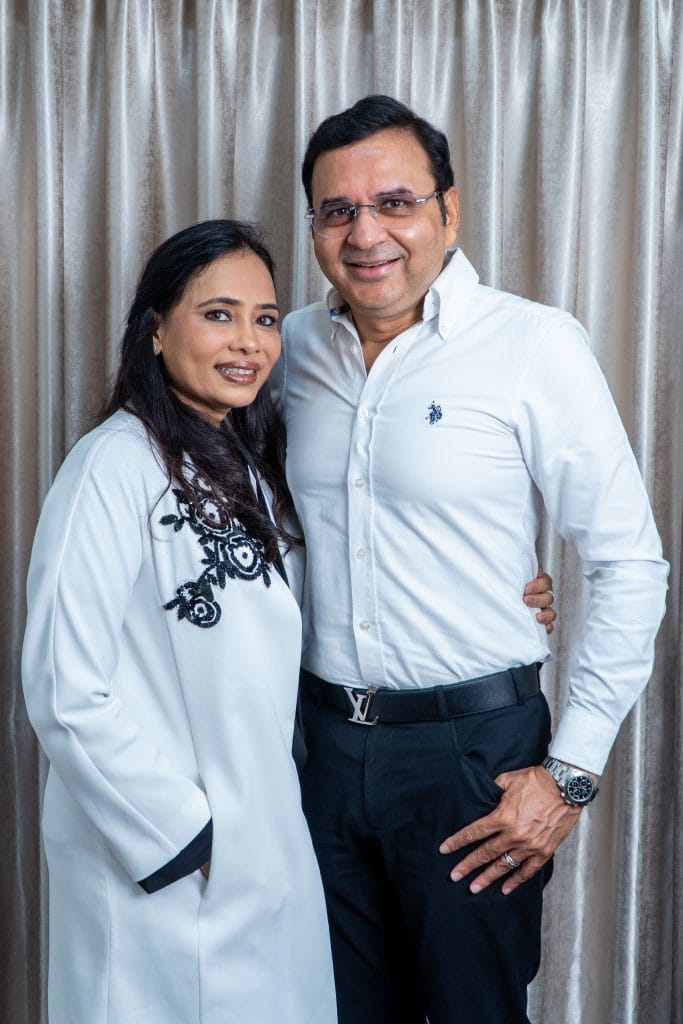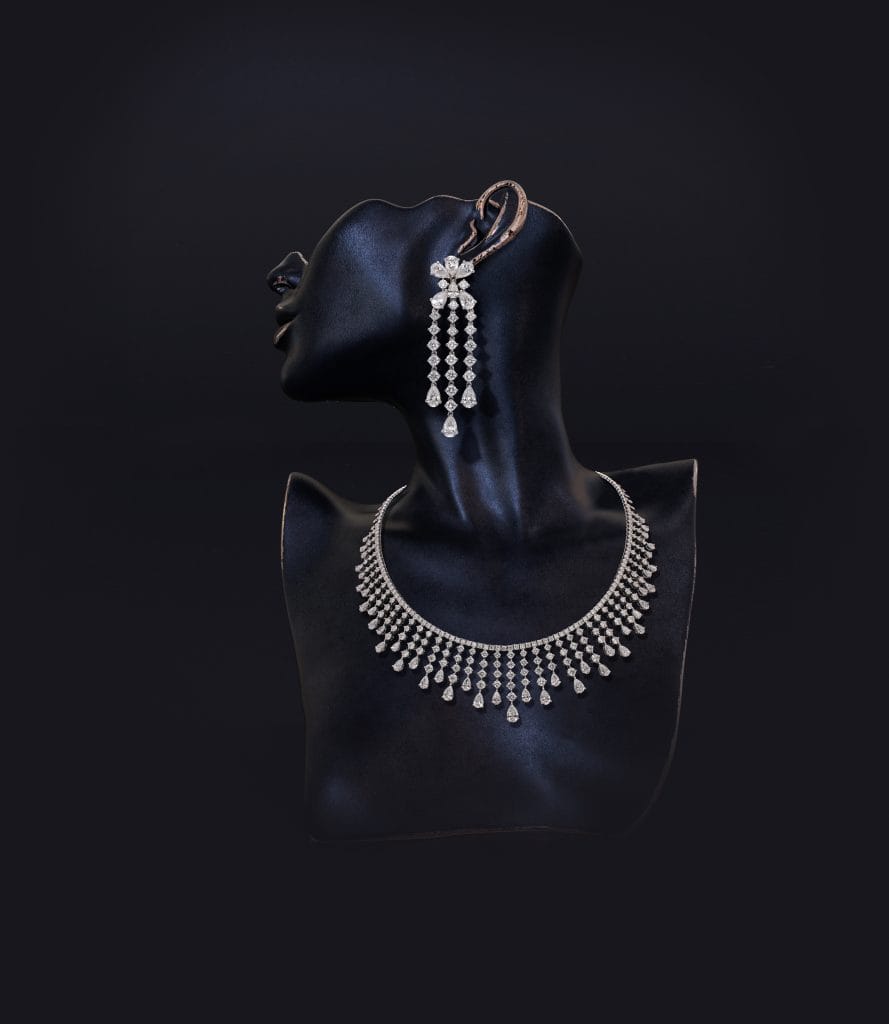A true jewel of the first water.
By Aiden Jewelle Gonzales
The jewellery industry is one that many in the Indian diaspora are familiar with, whether it’s from generations of experience in the family business, from meaningful family heirlooms to be passed down to future progeny, or even just knowing the right places to source a full set for your wedding. However, walking into Purity Jewelry’s factory – soon to be one of many in the city – still bowled me over with the level of industry and sheer number of people working in it.
“We’ve got hundreds of skilled artisans and craftsmen working towards our customers’ specifications and our own exacting standards,” Anjana Kothari, the co-founder of this now-global business tells me as she meets us at her office in the middle of all the bustle; fitting for someone who is at the very heart of the business. “I like to be at the centre of it all,” she says with a laugh, understandable for someone who grew the business from a few initial designs and pieces to one of the country’s leading manufacturers and exporters of fine jewellery.
Sophisticated and self-assured, Anjana was born and raised in Rajasthan where, she tells us, “having great values and being well- mannered was more important than anything else.” It’s easy to see her upbringing in her poise as she introduces herself, although, she reveals, she also indulged in more than just the trappings of domesticity that was often all that was required of women back then. “My family was very supportive when it came to my education or me playing sports; in fact, I played almost all the sports available to me at the time, some even at the university level. I think that’s why I’ve always been very competitive and have had a positive approach towards solving problems, as well as leading from the front,” she says, referencing her climb to her current role as head of their business, one that was in some ways an uphill battle. That competitive zeal has stayed with her since, she reveals, and triggered her entrepreneurial spirit despite the challenges.
“In the initial days, it was only me and one more person who were handling everything,” she recalls as she gives us a tour, and there’s no need to verbalise how far they’ve grown – it’s clear from the multiple floors and departments of the business, including a Quality Control booth in every section. What’s even more impressive is that Anjana didn’t have any previous professional experience in managing a business before starting Purity Jewelry, nor any formal training or certification, just her family’s background in the industry, which she was drawn to because of its potential for creativity. “I used to go to my family’s office frequently, and there, I learned everything from the basics,” she says. “I worked in almost all the departments before I started Purity: from learning about diamonds and colour stones, to sorting them, to accounting, where I learned pricing and cost structures.”
I ask her how Purity Jewelry began, and she walks me through her decision to design and manufacture a few pieces and sell them with only a saleswoman at her side. “After the initial good response, we felt it was the right time to start something formally, and my family suggested we should set up a new company. That’s how Purity was born,” she says, modestly succinct about a germ of an idea that has now expanded to New York, Hong Kong, Mumbai, and Dubai, the latter of which Anjana mostly handles, as “it’s the women there who buy the jewellery.”
This concept of catering specifically to women came from Anjana’s determination to stand out from the competition, and to leverage her own experience as a woman with an eye for jewellery. “I felt that I was better able to judge and predict the trends which would work in the market,” she says. “I was always on the lookout for what it is that women are interested in, what designs are trending in which markets, and what types of products work in different seasons, which required me to travel to different cities and markets. I started incorporating all this information during our product design and development, and this is what I feel give us an edge over competition.”
Becoming such a recognisable name in the industry was hard-won, however, and Anjana is candid about the challenges in getting it off the ground. “The struggle did not end after we started Purity. In fact, it only grew,” she recalls. “Since we did not have even the basic manufacturing set up, we had to outsource most of the work. I had to find different vendors, contract manufacturers, designers, etc. who could work with us in small quantities and provide us with their services at the cheapest cost.” This, she tells me, required travelling to small workshops in various markets, and working against the clock to get orders made within their timelines.
Never one to back away from a challenge since her sportswoman days, however, Anjana credits her childhood with her never-give-up attitude, and the support from her family members and team that allowed her to balance her life as a high-powered entrepreneur and mother. “My husband, Poonam Chand Kothari, especially went out of his way to support me, and has always stood beside me in all my decisions,” she says. “Moreover, for any business to succeed and grow, you need a very solid team, which I was blessed with. Aside from my husband, Vikram Goleccha, or Vicky bhaiya as I call him, played a very important role in the success of Purity Jewelry.
“My kids were very young when we started, and as much as I wanted to be deeply involved in the business, I didn’t want to miss seeing my children grow. I decided to look after the operations and handle product design and development from Bangkok, but we still needed someone to travel to different exhibitions to sell my creations and bring in revenue for the company. I was fortunate enough to have Vicky bhaiya and my husband by my side who put in a lot of hard work and sacrifice.”
She also stresses the importance of the right team to delegate to, in order to ease the work pressure and reduce your burden at home. “I was lucky enough to have my husband, his elder brother Sunil Ji Kothari, and my bhabhi, all of whom allowed me to have an easy time at home,” she says. “My staff and team at Purity Jewelry took on many responsibilities on themselves, and allowed me to focus just on core operations and key decision making.”
The team’s collective efforts, Anjana tells me, is one of the ways they expanded the business to multiple markets worldwide, together with proper division of responsibilities. “We also made the most of our business group’s strong network on the supply side,” she says. As for how they plan to grow the business in the ever-evolving industry, she cites the importance of agility and quick-decision making, which she says is baked into the DNA of the business. “One principle that we have always lived by and have also trained our teams for is to keep our ears on the ground and be connected to the customers and the different markets/ geographies that we operate in. We aim to always be one step ahead so that we are better positioned to take on challenges.”
She also talks about the next generation with pride: “with their involvement, the strategies have been evolving at an even faster pace, and the team’s capabilities have been harnessed multifold.” For example, she tells me, her son Divij Kothari has been focused on leveraging technology since the beginning, in order to simplify the front end and provide the best customer experience. “We are proud to say that because of this change in the thought process of our organisation, we have now actively started focusing on RnD and have been able to introduce newer machines/technology to become more efficient.”
I ask her what she’s learned about herself during this journey, and it’s clear that a big part of that is gratitude. “It’s made me more patient and thankful for the small things in life,” she says with a smile. “It’s been a life-long management lesson. I’ve learnt how to optimally utilise resources and extract maximum value, and how to be a multi- tasker and how to efficiently use time.” Part of those life lessons, she reveals, were part of being a woman in the male-dominated industry of entrepreneurship. “Because my family and my husband were so supportive, I didn’t have to go through a lot of hardships which others might have gone through in order to break those social barriers,” she says.
“But there were times initially where I felt displaced, because during shows and exhibitions, I hardly met women on the customer or the supplier side. But times are changing.” As for what a high-powered woman like her does during her time off? Her answers are expected – cooking, travelling, spending time with her family – and also unexpected, as I learn about her role as the chairperson of the JITO Ladies Wing’s Thailand chapter, a worldwide business networking organisation.
“I’m also involved with various charities and social causes that work towards women and children in Thailand and India and I make sure I spend a good amount of my time and energy towards it,” she says, although in typical modest fashion, she declines to toot her own horn too much.
Finally, I ask for her advice for women who are hoping to establish their own brands, or have become leaders in their field, and she quotes John F. Kennedy: “We choose and want to go to the moon not because it is easy but because it is difficult.” This, she tells me, is one of her husband’s favourite quotes when someone tells him they’re facing some difficulties. “As humans, we get the most satisfaction when we accomplish something which we thought was very tough or impossible. Everything may seem impossible on day one but only if you keep at it, with focus, determination and the right intention, everything becomes possible. It doesn’t matter if you aren’t educated or don’t have the skills, you will reach there eventually. To summarise, have the right vision, make effective goals, keep working hard towards it, and success in any endeavour of yours will follow,” she says – advice that proves why she truly is a gem of a woman.









